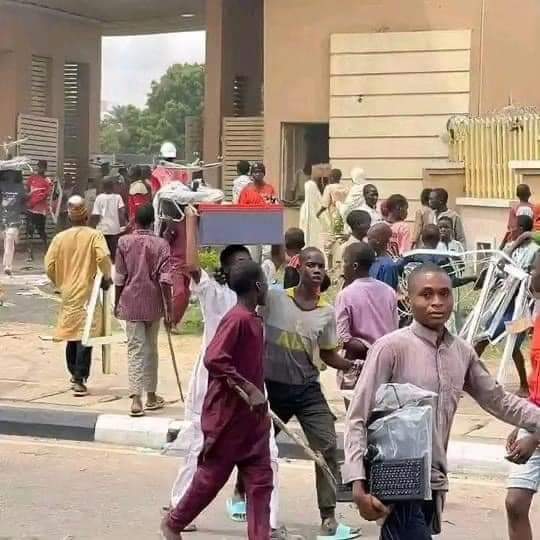Inside Story of Kano’s Digital Innovation Park Razed by Protesters
By Abbas Badmus
In November 2022, the former Executive Vice Chairman of the Nigerian Communications Commission (NCC), Prof. Umar Garba Danbatta, unveiled an ambitious project that promised to propel Nigeria into a new era of digital economy: the Nigeria Digital Innovation Park in Kano.
This initiative was not an isolated effort; it was part of a broader strategy by the NCC, announced as far back as 2020, to establish ICT parks across Nigeria’s six geo-political zones.
These parks were envisioned as epicenters of digital innovation, entrepreneurial activity, and skill acquisition, tailored to empower Nigerian youths and foster a culture of self-reliance and job creation.
The federal government’s vision was clear and focused. Through the NCC, it aimed to establish ICT parks that would serve as hubs of innovation and skill development. Four strategic locations were initially selected: Abeokuta in the South-West, Enugu in the South-East, Maiduguri in the North-East, and Kano in the North-West.
These parks were to be much more than mere physical structures; they were to become laboratories of innovation where the brightest minds could converge, collaborate, and create solutions to the challenges facing Nigeria’s burgeoning digital economy.
The vision was grand: to empower Nigerian youths by equipping them with cutting-edge digital skills and the entrepreneurial spirit necessary to drive the nation’s economy forward. The parks were designed to provide state-of-the-art infrastructure and an enabling environment for ICT startups to flourish.
This would not only lead to job creation but also contribute significantly to economic diversification—a critical objective in a country that has long been dependent on oil revenues.
In the words of Prof. Danbatta, “The whole idea of putting these two things (i.e., skill acquisition and innovation) at the forefront of this very important initiative is to produce youths that can be self-reliant, generate employment for themselves and for other Nigerians.”
His statement captured the essence of the project: a commitment to nurturing a generation of Nigerian youths who would no longer rely on government jobs but would instead become job creators in their own right.
Fast forward to 2024, the Kano ICT Park, a beacon of hope for many, met a tragic and untimely end before it could even begin to fulfill its promise. During the recent #EndBadGovernance nationwide protests, the park was not only looted but also set ablaze, reducing what was supposed to be a symbol of progress and innovation to smoldering ruins.
The park had been meticulously designed to include state-of-the-art laboratories for ICT innovations, as well as commercial hubs intended to bolster the capacity of startups. It was supposed to be a launchpad for the next generation of Nigerian tech entrepreneurs—a place where ideas could be transformed into marketable solutions, where young Nigerians could gain the skills needed to compete in the global digital economy.
The destruction of the park has been met with widespread dismay. Dr. Bosun Tijani, the Minister of Communications and Digital Economy, voiced his sorrow, stating, “Sad to learn that our Digital Innovation Park in Kano to support our technical talent accelerator (3MTT) has been set ablaze and looted by protesters.” His statement echoed the sentiments of many who recognized the park as a lost opportunity for countless young Nigerians.
The burning of the Kano ICT Park is more than just the loss of a building; it represents the loss of a future for many young Nigerians who could have leveraged the resources and opportunities the park was meant to provide. The park was not merely an infrastructure project; it was a cornerstone of the government’s strategy to diversify the economy, reduce unemployment, and empower a new generation of innovators.
In a country where the youth unemployment rate is alarmingly high, and where the digital economy is seen as a crucial pathway to economic recovery and growth, the loss of the Kano ICT Park is a significant setback. It is a stark reminder of the fragility of progress in the face of social unrest and the urgent need for a renewed commitment to protecting and nurturing such critical national assets.
The tragedy of the Kano Digital Innovation Park underscores the importance of ensuring that such initiatives are shielded from the turbulence of political and social upheaval. As Nigeria continues to grapple with the challenges of nation-building and economic diversification, the lessons from the Kano ICT Park must not be lost. The aspirations of millions of young Nigerians hang in the balance, and the path to a prosperous digital future must be paved with resilience, foresight, and unwavering commitment.
















